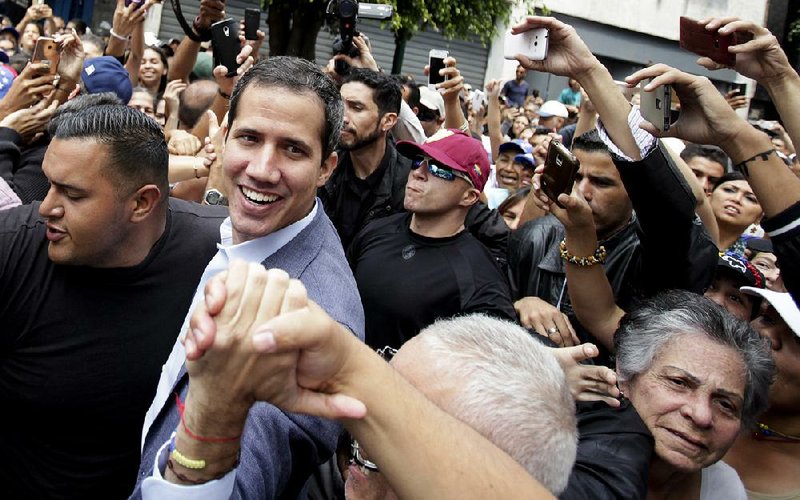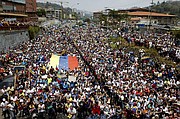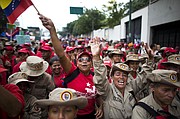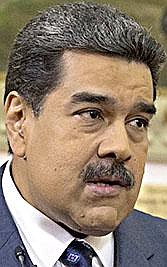CARACAS, Venezuela -- Venezuelan opposition leader Juan Guaido on Saturday took his campaign for change to one of the country's most populous states, while supporters of the man he is trying to oust, President Nicolas Maduro, held a rival demonstration in the capital after another nationwide blackout.
Guaido, the U.S.-backed leader of the opposition-controlled National Assembly, made several stops in Miranda state near Caracas, delivering denunciations of Maduro's government and promises of a better life for Venezuela's struggling population. Speaking from podiums in the street, the 35-year-old politician drew applause when he said even bigger protests will be held April 6 as the opposition intensifies its push to topple Maduro.
"Are you afraid?" Guaido asked at a stop in the town of San Antonio de Los Altos.
"No," the crowd roared.
The opposition chief acknowledged power failures and other hardships in Venezuela as well as pressure from Maduro's government, which retains the pivotal support of the nation's military leadership.
Meanwhile, backers of Maduro gathered for what was billed as an "anti-imperialist" rally Saturday in the capital.
As at Guaido's rallies, some demonstrators at the pro-Maduro rally held Venezuelan flags and said they wanted to save the country. They filed toward the rally point, wearing red clothing associated with the socialist movement started by the late Hugo Chavez and reciting revolutionary slogans such as: "Always loyal! Never traitors!"
Diosdado Cabello, a leading pro-government politician, gave a fiery speech, mocking the opposition for its hopes that Maduro would quickly fall and accusing its leaders of "pretending to be democrats."
Such dueling demonstrations have become a pattern in past weeks as Venezuela's opposing factions vie for control of a country that has endured economic turmoil and a deepening humanitarian crisis. The situation worsened this month because of several nationwide blackouts, most recently on Friday evening.
Power returned to many areas Saturday morning, but more power failures struck Saturday night.
Maduro blames the recent blackouts on U.S.-directed sabotage, an allegation that Guaido routinely dismisses as the desperate talk of a government that has presided over the collapse of infrastructure in a country that was once among the wealthiest in Latin America.
"They don't dare tell the truth," Guaido said. "Because to tell the truth would be proof of their corruption."
Maduro has responded to Guaido's sharp criticisms with his own tough language, describing him as a "diabolical puppet" attempting to execute a coup plot on behalf of the United States, which has imposed sanctions on Venezuela.
Venezuelan security forces have detained Guaido's chief of staff, but have yet to move directly against the opposition leader, whose claim to be interim president is backed by dozens of countries that say Maduro's re-election last year was rigged.
As both sides tried to steer public opinion in their favor, Guaido described his anti-government movement as "Operation Liberty," while Maduro said he was leading a campaign "in defense of liberty."
The rallies came a day after the International Federation of Red Cross and Red Crescent Societies said it is poised to deliver aid to Venezuela next month. The humanitarian group says it will remain neutral and has warned both sides in the Venezuelan conflict not to interfere with the aid distribution.
BLACKOUT DAMAGE
The blackouts, coupled with new U.S. sanctions on Venezuela's critical oil sector, have pushed the country even closer to total economic collapse.
The nationwide March 7 blackout, which lasted almost five days, drained about $1 billion from Venezuela's gross domestic product, or about 1 percent, according to investment bank Torino Capital. More than 500 businesses were looted, at least 40 hospital patients died and at least a half-dozen factories were shuttered.
Oil production equivalent to the entire output of a small petrostate like Brunei was irretrievably lost to the damage caused to oil fields by the sudden loss of power, according to IPD Latin America, a consultancy.
The blackout followed the U.S. ban in January on any purchases of Venezuelan oil.
"The sanctions make it almost impossible for the government to buy and import the things they need to run a country," said Francisco Rodriguez, Torino Capital's chief economist.
Many opposition supporters see the economic pain as a bitter medicine required to get rid of Maduro. But to the president's supporters, the sanctions provide a foil to deflect blame for economic ills.
Faced with shrinking oil revenue and an exodus of technicians, Maduro has struggled to re-establish basic services since the March 7 blackout. Water flow has been intermittent in most cities, and students and state workers stayed home last week after a fire at an electrical substation led to another blackout.
"If I have to sacrifice a month to live without power or water, I will do it because I know it's the only way of improving this country," said Valdemar Alvarez, a lab analyst at the Sidor steel plant in Puerto Ordaz, who opposes Maduro.
Venezuela's economy is set to lose more than a quarter of its size this year, according to Rodriguez, one of the few Wall Street economists who still tries to forecast the scale of the country's decline. Inflation is on track to reach 51 million percent by year's end, rendering the national currency virtually worthless.
The magnitude of the country's collapse has been surpassed only by Zimbabwe in modern history, according to the Institute of International Finance.
Venezuela's crude-oil production, which used to provide more than 90 percent of the country's hard currency, fell 13 percent in February -- the steepest decline in a decade -- according to OPEC.
It was the first month since the U.S. Treasury banned American companies from any dealings with the national oil producer, Petroleos de Venezuela S.A.
Sanctions, power cuts and an accelerating brain drain could wipe out 60 percent of Venezuela's oil production this year, according to consultants at IPD. Its analysts see the country's output falling from 1.36 million barrels a day in February to a mere 550,000 barrels a day by the end of December, roughly on par with tiny Ecuador.
The United States, once Petroleos de Venezuela S.A.'s biggest customer, bought no Venezuelan oil in March for the first time since the 1970s, according to the Department of Energy. And the ban does not officially come into force until April.
The sanctions have made it difficult for the government to import the diesel fuel needed to run its thermal power plants. Petroleos de Venezuela's dilapidated refineries, once some of the world's biggest, have long ceased to cover national needs for products such as gasoline and diesel fuel.
Poor supply and maintenance of thermal power plants meant Venezuela was left without backup electrical supply when a wildfire under a transmission line brought down the country's main hydropower plant March 7.
The blackout erased the last remnants of Venezuelan steel, aluminum and iron production, which Maduro had touted as alternatives to oil exports for income generation.
More than 10,000 workers had been reporting for shifts at the moribund plants to get free meals at the canteens, which had become the main source of food for many. Hyperinflation has long slashed their wages to a few dollars a month.
"It's like working in a coma," said Rona Figueredo, union leader at the Briquetera del Orinoco iron plant in Puerto Ordaz, which shut down its last production line during the blackout.
At least half a dozen other state-run metals plants have ceased operating since the blackout, including the flagship Sidor steel plant, the Alcasa and Venalum aluminum plants, and three iron smelters, according to workers.
It was the "final nail in the coffin" for the industries that had been operating at single-digit capacities after years of mismanagement, said Damian Prat, a veteran Puerto Ordaz labor activist and author of a book on Venezuelan heavy industries.
The government has blamed electrical problems on what it has described as sabotage directed from the United States, without providing evidence. Government officials also said state-run heavy industries have maintained production despite the blackout.
"Without these industries, there can't be economic recuperation in Venezuela," Prat said.
Information for this article was contributed by Jorge Rueda and Christopher Torchia of The Associated Press; and by Anatoly Kurmanaev and Maria Ramirez of The New York Times.
A Section on 03/31/2019



